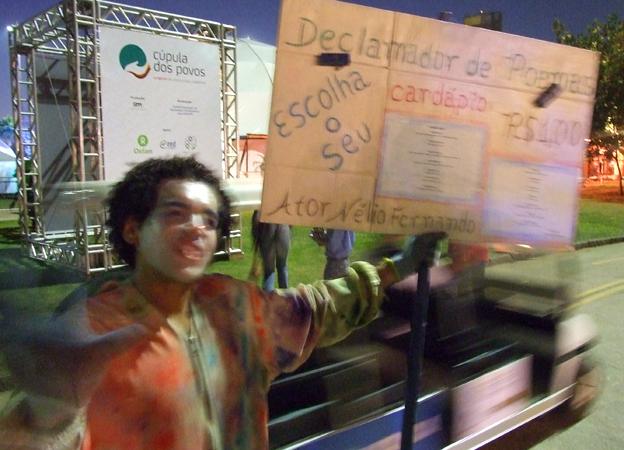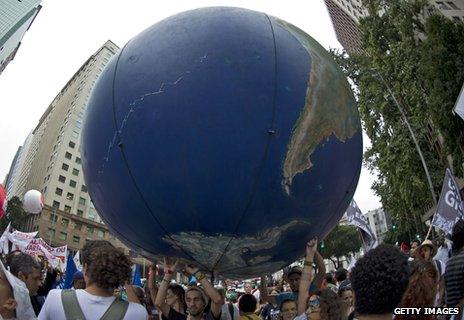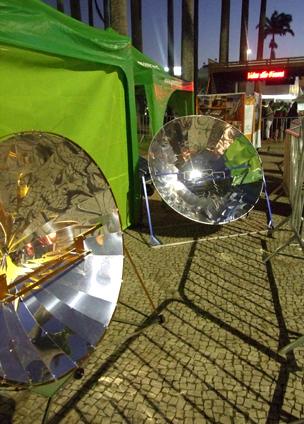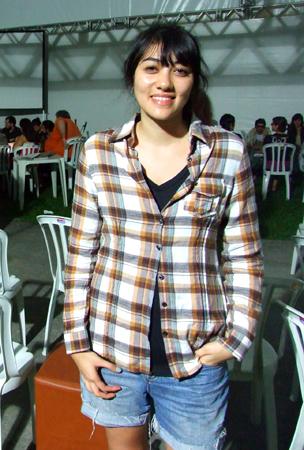Poems and politics at the heart of Rio
- Published
- comments

It's not every day you get to buy a poem for the price of a cup of coffee. If you like the idea, Nelio Fernando is your man.
Choosing a word that I hope will work in Portuguese, I ask him for something "ambientale" - environmental - and he begins to declaim.
"Don't want a homeland, don't divide the Earth," he enjoins, quoting the words of Brazilian poet Cecilia Meireles (in Portuguese, with translation brought to you by BBC colleagues).
"Don't divide the sky, don't throw pieces into the sea.
"Don't desire - be born way above - that all things will be yours."
Nelio is an example of local-style micro-capitalism in action at the Cupula dos Povos, the People's Summit.

Half-way across Rio in geographical terms and half a world away in some of its ideology, this alternative gathering is an organic smorgasbord of discussion groups, music, small-scale technology demonstrations, local food, culture, and a few other things as well.
Awnings stretch across discussion areas. Birds sing, children play on the grass, boats sway in the sea next to Flamengo Park, in the heart of Rio.
A band of flutes and drums ambles across the park, people making dalliances with the dance as they pass.
Two things that wouldn't be welcome here are neoliberalism and corporations; they're words that crop up in many of the discussions, and not in a good way.

Solar reflectors
"The Peoples' Summit in general is the grassroots reaction to what's happening at Rio+20," says Darcy O'Callaghan, who works in Washington DC for the NGO Food and Water Watch.
"We fight against privatisation and commodification of water.
"And in Rio, we're seeing more and more the multinational water corporations as well as multinational water users trying to buy their way into policy spaces so they can secure enough input and enough market for their products."
One of the most persistent criticisms of the United Nations summit here is that it's been "bought" by corporations.
Certainly, scions of the corporate world are everywhere - on panel discussions, making announcements about things like clean energy and sustainable water use - and in some cases, lobbying against bits of the political declaration that they don't like.
And as those at the People's Summit point out, they're on campus, around the dinner table with government delegates and UN officials, rather than a two-hour bus journey across town like the anti-corporates.
The official UN view is that the corporate sector needs to be fully engaged because without it, things aren't going to change.
It's a view endorsed by many governments too, and by some NGOs who choose to work with businesses rather than rail against them.
But it finds short shrift in the Cupula dos Povos.

Carole Tokuyo
For Carol Tokuyo, one of a group meeting under the banner "Youth and Environmental Justice", the culture of consumption and private gain is the root of the problem - the reason why humanity is on an unsustainable track.
In their own lives, they're doing things differently.
"We are a network across the whole of Brazil, in every state," she explains.
"We are making profound changes: we are collectives, we live together in big houses with 10 to 20 people, we eat together, we have our own money which we share together."
The sharing extends to education; the group has created an online e-university, Carol tells me, where people swap knowledge with each other rather than having to buy it.
The tent next to hers is rocking to a band whose rhythms and melodies create a kind of mixed African and Latin vibe; and it's with some surprise that I see that the banner on the tent reads Interfaith Dialogue against Religious Intolerance.
But my guess about the music turns out to be spot on.
"We have the African-Brazilian religion people and they're fighting for their rights," an imposing gentleman, whose name I don't quite grasp over the music, tells me.
These are the descendants of slaves brought to Brazil in the late 1700s and early 1800s who've not been assimilated into mainstream Brazilian society.
"They have lots of problems, they face lots of prejudice, and sometimes the state doesn't help.
"Today we have been discussing the creation of special areas inside environmentally protected places that could be set aside for their religious practices."
At the Stockholm environment summit of 1972 - the world's first - and at the Earth Summit here in 1992, the activists' gatherings were acknowledged as the conscience of the meeting.
This time, they're aiming to play the same role, and making much the same arguments. But it's not clear this time who's listening.
On my way out, I see a lot of happy faces - hardly surprising as they've had an afternoon of good food, great music, a bit of dancing and a bit of poetry to leaven the serious messages.
It's a lot more fun than the bigwigs' paw-wow over at Rio+20. But it's still the bigwigs who are running the show.